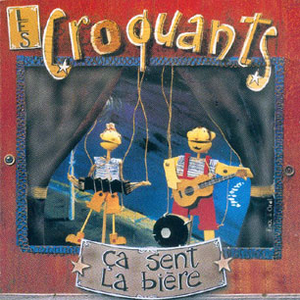Adieu cher camarade
Les Croquants Lyrics
Jump to: Overall Meaning ↴ Line by Line Meaning ↴
Faut quitter la bamboche à bord il faut aller !
En arrivant à bord, en montant la coupée,
A l'officier de quart il faudra se présenter
Faudra se présenter.
Coup de sifflet du Maître, poste d'appareillage !
Autour du cabestan se range l'équipage.
Aux ordres d'un premier maître nous astique les reins,
Nous astique les reins.
Jours de fête et dimanches on nous fait travailler
Comm' les bêtes de somm' qui sont chez nos fermiers
Pour ration, des gourganes, des biscuits pleins de vers
Le quart de vin en bas et la nuit, les pieds aux fers,
La nuit, les pieds aux fers.
Et vous, jeunes fillettes qui avez des amants
Bourlinguant tout là-bas à bord des bâtiments,
Ah ! soyez-leur fidèles, gardez bien votre coeur
A ces marins modèles qui ont tant de malheur,
Qui ont tant de malheur.
Et si je me marie et que j'ai des enfants,
Je leur cass'rai un membre avant qu'ils ne soient grands
Je ferai mon possible pour leur gagner du pain
Le restant de ma vie pour qu'ils ne soient pas marins
Qu'ils ne soient pas marins
"Adieu cher camarade" by Les Croquants is a French song about a sailor saying goodbye to his friends and loved ones before departing on a voyage. In the first verse, the sailor acknowledges that it's time to leave the festivities and board the ship. Before boarding, he must report to the officer in charge. The second verse describes the process of getting ready to sail, with the crew lining up around the capstan, and a young sailor being ordered to check their equipment. The next stanza talks about the difficult life of sailors – they work even on special occasions like Sundays, eating meagre rations and sleeping with their feet shackled. Finally, the singer addresses the women who have lovers at sea, encouraging them to remain loyal to their sailor partners.
The song "Adieu cher camarade" reflects the harsh conditions of maritime life in the 19th and early 20th centuries. Sailors were expected to work hard and serve long periods at sea, often with little or no chance of returning home for months, or even years. The song also portrays the emotional toll of such departures on the sailor's friends and loved ones. Overall, the song is a bittersweet reflection on the sacrifices required by adventure and travel.
Line by Line Meaning
Adieu, cher camarade, adieu, faut nous quitter
Goodbye, dear comrade, we must leave. It's time to leave the revelry and board the ship.
Faut quitter la bamboche à bord il faut aller !
We must leave the party and board the ship.
En arrivant à bord, en montant la coupée,
Upon arriving onboard and climbing the ladder,
A l'officier de quart il faudra se présenter
We must introduce ourselves to the officer in charge.
Faudra se présenter.
We must present ourselves.
Coup de sifflet du Maître, poste d'appareillage !
The master blows his whistle and we set sail!
Autour du cabestan se range l'équipage.
The crew gathers around the capstan.
Un jeune quartier-maître, la garcette à la main,
A young boatswain's mate, carrying a rope,
Aux ordres d'un premier maître nous astique les reins,
Under the orders of a senior petty officer, he flogs us.
Nous astique les reins.
He whips us.
Jours de fête et dimanches on nous fait travailler
On holidays and Sundays, we are forced to work.
Comm' les bêtes de somm' qui sont chez nos fermiers
Like the livestock on our farmers' lands.
Pour ration, des gourganes, des biscuits pleins de vers
Our rations consist of beans and wormy biscuits.
Le quart de vin en bas et la nuit, les pieds aux fers,
We have a quarter of wine below and at night, our feet are in irons.
La nuit, les pieds aux fers.
At night, our feet are restrained.
Et vous, jeunes fillettes qui avez des amants
And to you, young girls who have lovers,
Bourlinguant tout là-bas à bord des bâtiments,
Sailing far away on board ships,
Ah ! soyez-leur fidèles, gardez bien votre coeur
Be faithful to them, keep your heart safe.
A ces marins modèles qui ont tant de malheur,
To these exemplary sailors who have so much misfortune.
Qui ont tant de malheur.
Who have so much misfortune.
Et si je me marie et que j'ai des enfants,
And if I get married and have children,
Je leur cass'rai un membre avant qu'ils ne soient grands
I will break their limbs before they are grown.
Je ferai mon possible pour leur gagner du pain
I will do my best to earn them a living.
Le restant de ma vie pour qu'ils ne soient pas marins
For the rest of my life, so that they will not become sailors.
Qu'ils ne soient pas marins
So that they will not become sailors.
Contributed by Alexis J. Suggest a correction in the comments below.
